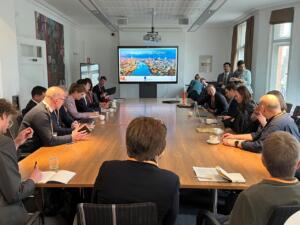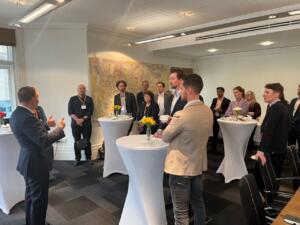NL-UK Collaboration on Circular Construction
April 04, 2023
From March 6th to 7th, the Ministry of Infrastructure and Water Management, the Embassy of the Kingdom of the Netherlands in the United Kingdom, and Holland Circular Hotspot organised a visit to the United Kingdom on Circular Construction.
The Netherlands and the United Kingdom are collaborating on circular construction with the aim of reducing the environmental impact of the construction industry. For two days, the visit brought together Dutch and British organisations to share innovative ideas, discuss challenges, and identify opportunities for collaboration between the two countries.
The two countries shared knowledge and expertise on circular construction, which areas such as circular design, the use of sustainable materials, and the development of circular business models. The partnership is expected to lead to the development of innovative solutions and the creation of new economic opportunities.

"Great examples of circular innovation and entrepreneurship can be found in the UK, and the enthusiasm we experienced for B2B Dutch-British collaboration is promising"
Stéphanie Schuitemaker, Project Manager Internationalization, HCH
Activities
Day 1: Dutch delegation visited London and discusses circular construction developments with British stakeholders
Before the programme at the Dutch Embassy started, the delegation from the Netherlands kicked off with an architecture tour in the City of London, led by New London Architecture. At the Dutch Embassy, both Dutch and British stakeholders were welcomed to discuss circular construction developments in the United Kingdom and how this compares to the Netherlands.
Insightful presentations by experts explored the circular construction context in the Netherlands and the United Kingdom, setting the stage for a roundtable conversation on the challenges and opportunities for a circular built environment. The following presentations were given:
- Katherine Adams from Reusefully / Alliance for Sustainable Building Products discussed the UK Policy Context and Zero Avoidable Waste
- Colin Rose from ReLondon presented The London Perspective
- Nithesh Magdani from Net Positive Solutions discussed UK Circular Construction Developments
- Arnoud Passenier from the Ministry of Infrastructure and Water Management presented the Netherlands Policy Context
- Heleen van Wijk from Groningen Seaports shared the insides of their region approach towards Industrial Symbiosis
The potential of reducing embodied carbon, data indicators, frameworks and financial incentives were elements that were highlighted in the different discussions. Several participants argued that transitioning towards a circular economy can contribute to the Netherlands and United Kingdom’s ambitions to achieve net zero by 2050. The presentations and exchange further provided information and insights that participants could use in their subsequent activities.
“A circular construction sector for both buildings and infrastructure will support achieving UK’s Net Zero Goals, but also shows to have a huge impact on many other national, international and global challenges,” Stéphanie Schuitemaker addressed.
The first day was concluded with a networking session hosted by the Dutch Embassy. Overall, the first day proved to be fruitful as participants exchanged further on how to engage on both systemic and technical levels laying the foundation for potential collaborations in the near future.




Day 2: Dutch delegation attends Futurebuild to explore innovative solutions for sustainable construction
On the second day, the delegation attended Futurebuild, one of the largest trade fairs in the United Kingdom that is focused on innovative developments that address the challenges facing the built environment, including solutions for retrofitting and sustainable materials. The Dutch delegation was welcomed by Futurebuild CEO Martin Hurn.
At the event, the delegation visited the Cradle to Cradle Product Institute for a short presentation on their stand and introductions to their manufacturers’ network. Finally, the delegation was free to participate in the Futurebuild conference programme, network, and share ideas and insights.


Main Findings
The main findings of the gathering between Dutch and British organisations provide insights into the circular construction context between the Netherlands and the United Kingdom:
- In the United Kingdom, carbon reduction is the main market driver for the future of the built environment in view of sustainability. Concrete ambitions for circular economy or resource efficiency play a relatively smaller role in this context. However, targets that aim to reduce embodied carbon can be an important demand driver. There is growing interest in adopting circular practices that can be instrumental in reaching net zero goals.
- In the United Kingdom, the government has taken a more market-led approach to drive needed developments in the construction sector. This has led enthusiastic frontrunners to engage with sector parties, including contractors, construction parties, and builders, in joint conversation and joint efforts to reduce raw material use, adapt designs and repurpose buildings and materials. This enthusiasm creates a convening power in the market and an opportunity to introduce new circular practices (e.g. in procurement frameworks). For Dutch sector parties, this presents interesting pathways to explore further collaboration and market development.
- At a local level, regions and municipalities are able to take a more government-led policy approach to drive sustainability in construction developments, and a number of large cities are fully exploiting this capability. At the local level, this leads to interesting opportunities when local governments are also considering plans to address large-scale housing needs and urban developments.
- Although the ambition for a circular economy is not yet a strong market driver in the United Kingdom’s construction sector, the ambitious climate agenda creates a growing momentum that unlocks the development and adoption of concrete circular practices. For Dutch sector parties, it is key to understand the importance of the climate agenda in the United Kingdom and the opportunities of using the carbon reduction potential of their products, services and expertise as a lever to exploit cross-border cooperation with United Kingdom partners and benefits from United Kingdom market developments.
